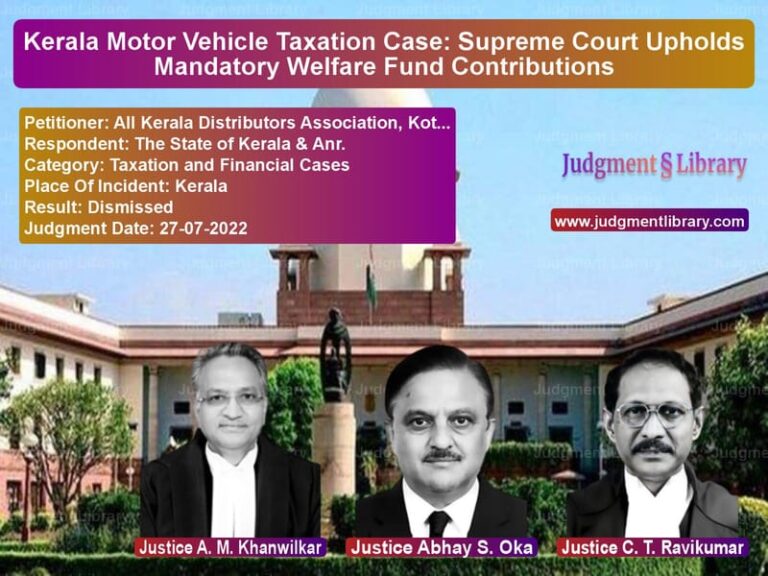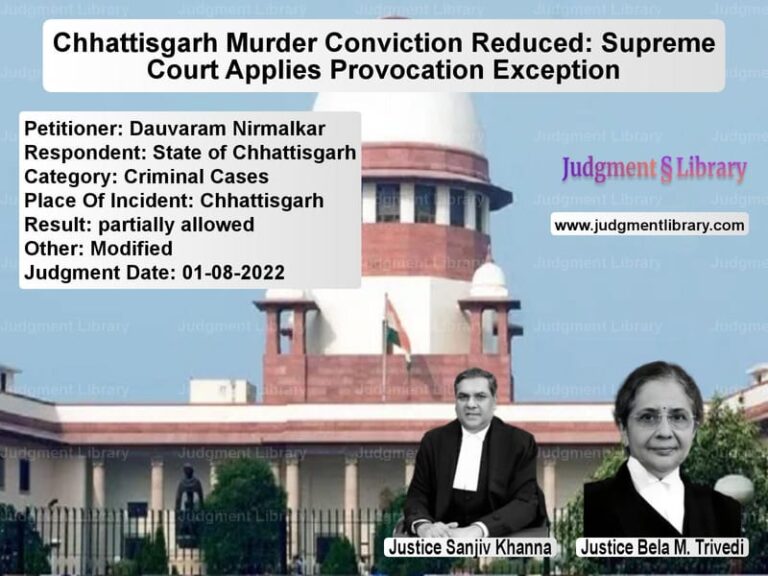Supreme Court Restores Charges in AIADMK Political Murder Case
The Supreme Court recently delivered a significant judgment in the case of K. Ravi vs. State of Tamil Nadu & Anr., reinstating charges against the accused in a high-profile murder case linked to a political dispute in Tamil Nadu. The judgment overturns an unusual order by the Madras High Court that had discharged Respondent No. 2 (Baskar, Accused No. 2) from the case, despite an earlier dismissal of his discharge plea.
Background of the Case
The case dates back to November 24, 2009, when an FIR was registered at the Dharmapuri Police Station against nine accused, including Baskar (A-2), for charges under Sections 147, 148, 323, 324, 307, and 302 IPC. The complainant, AIADMK member K. Ravi, alleged that the accused, led by Vetrivel (A-1), attacked his group at the AIADMK Party Office in Dharmapuri, preventing them from filing nomination papers.
According to the complaint, Accused No. 1 Vetrivel ordered his men to bring weapons from a vehicle parked nearby. Baskar (A-2) allegedly fetched weapons from his Tata Safari and assisted Vetrivel, who stabbed the complainant’s brother, Veeramani, in the chest, leading to his death.
Legal Proceedings and High Court Intervention
Following the police investigation, a chargesheet was filed, implicating 31 accused. During the trial:
- Baskar (A-2) moved a discharge application under Section 227 Cr.P.C., which was dismissed by the Sessions Court on July 1, 2016.
- He then approached the Madras High Court, which dismissed his revision plea on August 5, 2016, affirming that there was sufficient evidence to frame charges.
- Despite this, Baskar (A-2) filed another application under Section 216 Cr.P.C., seeking modification of the charges, which was again dismissed by the Sessions Court on October 18, 2016.
- He then filed a revision petition before the High Court, which in an unusual move, discharged him from the case on July 27, 2017.
Supreme Court’s Observations
The Supreme Court took a stern view of the High Court’s order, making the following key observations:
- The High Court’s decision to discharge Baskar (A-2) was improper, considering that his earlier discharge plea had already been dismissed and attained finality.
- The High Court failed to recognize that the order dismissing modification of charges was interlocutory and not subject to revision under Section 397(2) Cr.P.C.
- The trial court had rightly noted that the prosecution had sufficient eyewitness testimony to support charges against Baskar (A-2).
- The High Court overstepped its jurisdiction by interfering in the framing of charges, which should only be done under extraordinary circumstances.
Final Judgment
On August 29, 2024, the Supreme Court ruled:
- The Madras High Court’s order discharging Baskar (A-2) was set aside.
- The order of the Sessions Court framing charges against Baskar (A-2) was restored.
- The Supreme Court imposed a fine of Rs. 50,000 on Baskar (A-2) for filing frivolous applications aimed at delaying the trial.
- The Sessions Court was directed to expedite the trial against all accused and ensure swift proceedings.
Implications of the Judgment
The ruling has significant implications for criminal trials, particularly those involving political violence:
- Prevents misuse of Cr.P.C. provisions: The decision reaffirms that accused individuals cannot repeatedly file applications to derail criminal trials.
- Strengthens judicial discipline: High Courts cannot modify charges once an accused has been refused discharge in a previous ruling.
- Ensures fair trial for victims: By reinstating charges, the judgment ensures that the family of the deceased Veeramani gets a fair trial.
- Clarifies the scope of revision under Section 397 Cr.P.C.: The ruling reiterates that interlocutory orders cannot be challenged through revision petitions.
Comparison with Other Cases
The Supreme Court has previously ruled in similar matters, reinforcing its stance against procedural abuse:
- Amit Kapoor vs. Ramesh Chander (2012): The Court held that revisions under Section 397 Cr.P.C. should be limited to correcting jurisdictional errors.
- P. Vijayan vs. State of Kerala (2010): The Court emphasized that once a charge is framed, it should only be altered under exceptional circumstances.
- State of Maharashtra vs. Salman Salim Khan (2004): The Court ruled that interference in framing of charges should be minimal unless a case of no evidence is established.
Conclusion
The Supreme Court’s ruling in K. Ravi vs. State of Tamil Nadu is a significant decision ensuring that criminal trials, particularly those involving political disputes, are not derailed by procedural manipulations. By reinstating the charges against Baskar (A-2) and imposing costs for procedural abuse, the judgment strengthens the principles of fair trial and judicial efficiency.
Petitioner Name: K. Ravi.Respondent Name: State of Tamil Nadu & Anr..Judgment By: Justice Bela M. Trivedi, Justice Satish Chandra Sharma.Place Of Incident: Dharmapuri, Tamil Nadu.Judgment Date: 29-08-2024.
Don’t miss out on the full details! Download the complete judgment in PDF format below and gain valuable insights instantly!
Download Judgment: k.-ravi-vs-state-of-tamil-nadu-supreme-court-of-india-judgment-dated-29-08-2024.pdf
Directly Download Judgment: Directly download this Judgment
See all petitions in Murder Cases
See all petitions in Bail and Anticipatory Bail
See all petitions in Attempt to Murder Cases
See all petitions in Public Interest Litigation
See all petitions in Judgment by Bela M. Trivedi
See all petitions in Judgment by Satish Chandra Sharma
See all petitions in allowed
See all petitions in Quashed
See all petitions in supreme court of India judgments August 2024
See all petitions in 2024 judgments
See all posts in Criminal Cases Category
See all allowed petitions in Criminal Cases Category
See all Dismissed petitions in Criminal Cases Category
See all partially allowed petitions in Criminal Cases Category







